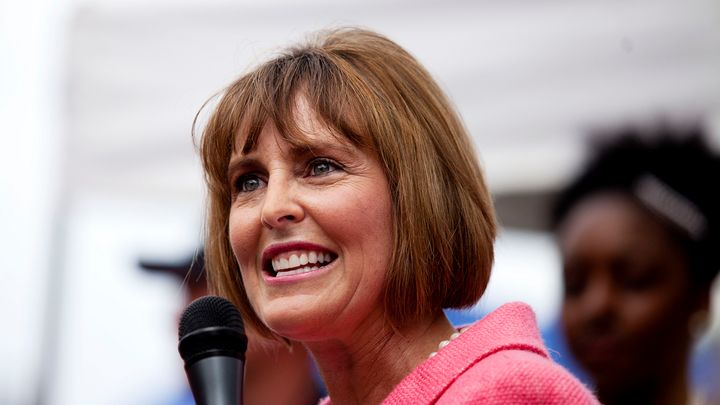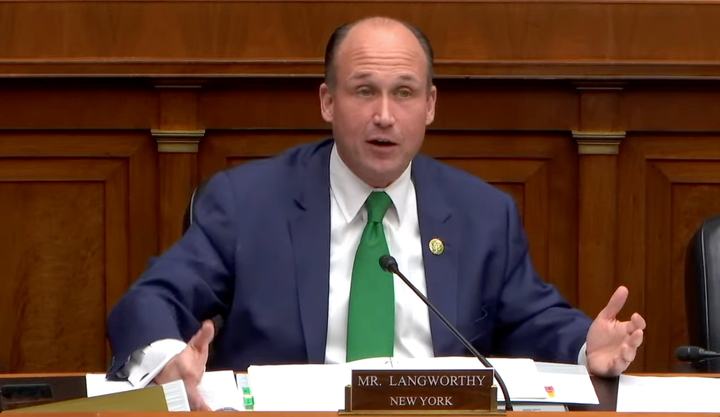UPDATE: In late January 2019, Castor said that she and her husband divested their money in this fossil fuel mutual fund “to build confidence in her leadership” as chair of the Select Committee on the Climate Crisis.
House Minority Leader Nancy Pelosi announced on Friday that a dormant global warming committee will be revived in the next session of Congress, and that it will be led by Florida Democratic Rep. Kathy Castor. The new committee, which may not have subpoena or legislative powers, will be called the Select Committee on the Climate Crisis.
Castor tweeted on Friday, “We should act with urgency to reduce carbon pollution,” adding that “failure is not an option.”
The Florida representative, a member of the Energy and Commerce Committee, has a good environmental voting record, according to the League of Conservation Voters, and has received a relatively small amount of campaign contributions from fossil fuel interests over her six-term career. But Castor’s 2017 financial disclosure document shows that she and her husband, Bill Lewis, share an investment worth between $50,001 and $100,000 in a mutual fund comprised mostly of holdings in utility companies that generate power from natural gas, oil, and coal. For a retirement account, the couple purchased shares in the Franklin Utilities Fund—Advisor Class, from July to October of 2017 and earned up to $2,500 in capital gains and dividends from the investment that year.
Castor’s office did not provide answers to Sludge’s questions about the representative’s investment.
I believe it’s morally unfathomable for our institutions and leaders to be invested in the companies that are responsible for destroying our planet and its people.
Varshini Prakash, Founder, Sunrise Movement
“It’s troubling that Rep. Castor has personal investments in mutual funds supporting the fossil fuel industry,” Waleed Shahid, communications director of the progressive Justice Democrats, who support an ambitious Green New Deal plan, told Sludge. “There’s a growing movement calling for government, business, and individuals to divest from fossil fuels and we hope Rep. Castor fully joins in the fight to take on Big Oil and Gas executives.”
“I believe it’s morally unfathomable for our institutions and leaders to be invested in the companies that are responsible for destroying our planet and its people,” Varshini Prakash, founder of the Sunrise Movement, told Sludge. “It should be a no-brainer for any politician who wants to claim the mantle of leadership, especially climate leadership, at this time in history to publicly reject the influence of fossil fuel CEOs and lobbyists.”
The majority of the holdings of the Franklin Utilities Fund—Advisor Class are in electric utilities that have oil and gas operations. Holdings in “multi-utilities,” oil and gas storage and transportation companies, and in water and gas utilities make up smaller portions of the fund.
The largest holding, 8.4 percent of the fund, is an investment in NextEra Energy, the second-largest natural gas power generator in the United States. The company also has billions of dollars invested in shale gas production and natural gas pipeline projects.
Holdings in Dominion Energy, a utility powered in part by oil, gas, and coal, amount to 5.2 percent of the Franklin fund, and 5.1 percent of the holdings lie with Exelon Corporation, a utility that generates power from a number of sources including natural gas and oil. Other fossil fuel-burning or natural gas-transmitting utilities in the fund’s holdings include American Electric Power Company, Sempra Energy, Duke Energy, and Xcel Energy.

While fossil fuel proponents claim natural gas is clean and is helping to reduce greenhouse gases, both extracting and burning the fuel negatively impact climate change. During hydraulic fracturing, or “fracking,” and natural gas transportation, a large amount of methane leakage occurs; methane, the primary component of natural gas, is at least “25 times more potent in trapping heat in the atmosphere than carbon dioxide.”
“One recent study found that methane losses must be kept below 3.2 percent for natural gas power plants to have lower life cycle emissions than new coal plants over short time frames of 20 years or fewer,” noted the Union of Concerned Scientists, citing a 2012 study.
Other other potential environmental dangers of fracking include groundwater contamination, gas explosions, and earthquakes.
Burning natural gas for fuel or energy is less carbon-emitting than oil or coal, but it still adds carbon to the atmosphere. When combusted, natural gas emits between 50 and 60 percent less carbon dioxide than emissions from coal-fired plants, according to the Union of Concerned Scientists.
On Monday, Castor told Sludge that she “will not accept contributions from the fossil fuel industry, to help build confidence in her leadership of the Select Committee.” It’s unclear whether this applies to donations from individuals who work in the industry. She will likely not require other members of the Climate Crisis committee to reject such donations, according to statements she made to HuffPost.
Prakash told Sludge that her organization wants all members of the committee to reject fossil fuel industry money.
“Any member of the Select Committee on Climate Change must have the courage to stand up to elite interests by taking the #NoFossilFuelMoney pledge and rejecting donations from the oil executives and lobbyists who’ve spent the last 50 years misleading the public on the climate science and buying out politicians to help them protect their profits, even as the world burns,” Prakash said.
While scrutiny of politicians’ campaign finance has become a major issue, members’ financial investments are often overlooked, despite the potential conflicts of interest they may pose. Sludge previously reported that several Democrats on key subcommittees of the Energy and Commerce Committee are personally invested in oil and gas companies.
Some environmental activists, including those in the Sunrise Movement and Justice Democrats, wanted a select committee on the Green New Deal, an ambitious proposal to make the United States greenhouse gas-neutral by 2030 and spearheaded by Rep.-elect Alexandria Ocasio-Cortez (D-N.Y.). Both groups are not pleased.
“We have yet to hear from leader Nancy Pelosi what the mandate of the ‘Select Committee on the Climate Crisis’ will be,” said Prakash. “If what we’re hearing is true—that Democrats are pushing for a Select Committee on Climate Change that has no subpoena power, lacks a mandate to confront the climate crisis in line with what the science demands, and will be peppered with fossil fuel-funded elected officials—then such a committee will be even weaker than the one from a decade ago. This is not the leadership this moment calls for.”
This Climate Crisis committee isn’t what the left wanted, but Castor told Sludge on Monday that she “is excited about the Green New Deal and shares [its backers’] sense of urgency for action.”



